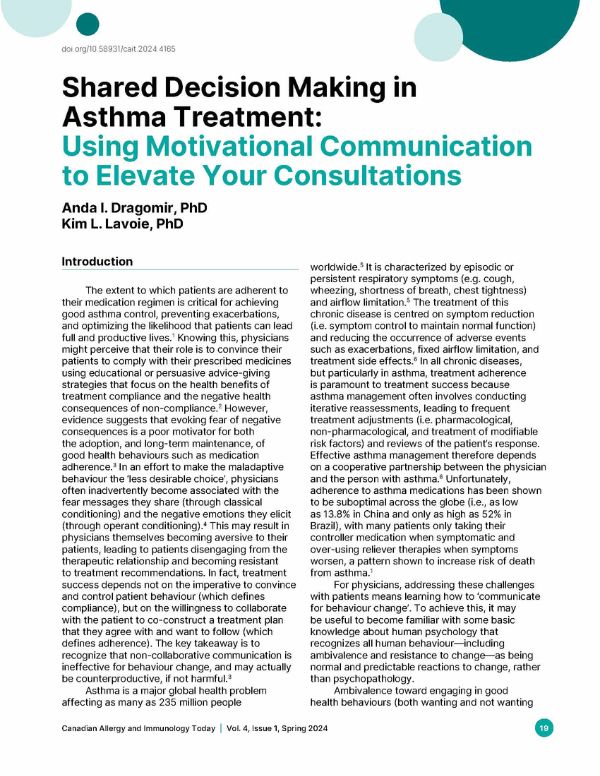Shared Decision Making in Asthma Treatment: Using Motivational Communication to Elevate Your Consultations
DOI:
https://doi.org/10.58931/cait.2024.4165Abstract
The extent to which patients are adherent to their medication regimen is critical for achieving good asthma control, preventing exacerbations, and optimizing the likelihood that patients can lead full and productive lives. Knowing this, physicians might perceive that their role is to convince their patients to comply with their prescribed medicines using educational or persuasive advice-giving strategies that focus on the health benefits of treatment compliance and the negative health consequences of non-compliance. However, evidence suggests that evoking fear of negative consequences is a poor motivator for both the adoption, and long-term maintenance, of good health behaviors such as medication adherence. In an effort to make the maladaptive behavior the ‘less desirable choice’, physicians often inadvertently become associated with the fear messages they share (through classical conditioning) and the negative emotions they elicit (through operant conditioning). This may result in physicians themselves becoming aversive to their patients, leading to patients disengaging from the therapeutic relationship and becoming resistant to treatment recommendations. In fact, treatment success depends not on the imperative to convince and control patient behavior (which defines compliance), but on the willingness to collaborate with the patient to co-construct a treatment plan that they agree with and want to follow (which defines adherence). The key takeaway is to recognize that non-collaborative communication is ineffective for behavior change and may actually be counterproductive, if not harmful.
References
Jansen EM, van de Hei SJ, Dierick BJH, Kerstjens HAM, Kocks JWH, van Boven JFM. Global burden of medication non-adherence in chronic obstructive pulmonary disease (COPD) and asthma: a narrative review of the clinical and economic case for smart inhalers. 2021;13(6):3846–3864. doi: 10.21037/jtd-20-2360
Arlinghaus KR, Johnston CA. Advocating for behavior change with education. Am J Lifestyle Med. 2017;12(2):113–116. doi: 10.1177/1559827617745479
Kok G, Peters GJY, Kessels LTE, ten Hoor GA, Ruiter RAC. Ignoring theory and misinterpreting evidence: the false belief in fear appeals. Health Psychol Rev. 2018;12(2):111–125.
Alliance DFA. Why scare tactics in drug messaging prevention don’t work. Columbus OH: Drug Free Action Alliance. 2013.
World Health Organization. Asthma [Internet] Geneva: World Health Organization; 2024. Available from: https://www.who.int/news-room/fact-sheets/detail/asthma
Global Initiative for Asthma. Pocket guide for asthma management and prevention [Internet]. Fontana WI; 2019 p. 1-32. Available from: www.ginasthma.org.
Boyle KE, Monaco HT, Deforet M, Yan J, Wang Z, Rhee K, et al. Metabolism and the evolution of social behavior. Mol Biol Evol. 2017;34(9):2367–2379. doi: 10.1093/molbev/msx174
Williams DM. Psychological Hedonism, Hedonic Motivation, and Health Behavior. In: Williams DM, Rhodes RE, Conner MT, editors. Affective Determinants of Health Behavior [Internet]. Oxford University Press; 2018. p. 204-234. Available from: https://doi.org/10.1093/oso/9780190499037.003.0010
Kato A, Fujimaki Y, Fujimori S, Izumida Y, Suzuki R, Ueki K, et al. A qualitative study on the impact of internalized stigma on type 2 diabetes self-management. Patient Educ Couns. 2016;99(7):1233–1239. doi: 10.1016/j.pec.2016.02.002
Ryan RM, Deci EL. Self-determination theory and the facilitation of intrinsic motivation, social development, and well-being. Am Psychol. 2000;55(1):68–78. doi: 10.1037//0003-066x.55.1.68
Steindl C, Jonas E, Sittenthaler S, Traut-Mattausch E, Greenberg J. Understanding psychological reactance: new developments and findings. Z Psychol. 2015;223(4):205–214. doi:10.1027/2151-2604/a000222
Abramson LY, Seligman ME, Teasdale JD. Learned helplessness in humans: critique and reformulation. J Abnorm Psychol. 1978;87(11):49–74.
Daniali SS, Mostafavi Darani F, Tavassoli E, Afshari A, Forouzande F, Eslami AA. The prevalence of depression and its association with self-management behaviors in chronic disease patients. Iranian Journal of Psychiatry and Behavioral Sciences. 13(1)
. https://doi.org/10.5812/ijpbs.10161
Marteau TM, Hollands GJ, Fletcher PC. Changing human behavior to prevent disease: the importance of targeting automatic processes. Science. 2012;337(6101):1492–1495. doi: 10.1126/science.1226918
Jamous RM, Sweileh WM, El-Deen Abu Taha AS, Zyoud SH. Beliefs about medicines and self-reported adherence among patients with chronic illness: a study in Palestine. J Fam Med Prim Care. 2014;3(3):224–229. doi: 10.4103/2249-4863.141615
Voisard B, Dragomir AI, Boucher VG, Szczepanik G, Bacon SL, Lavoie KL. Training physicians in motivational communication: an integrated knowledge transfer study protocol. Health Psychol. In press.
Dragomir AI, Boucher VG, Bacon SL, Gemme C, Szczepanik G, Corace K, et al. An international Delphi consensus study to define motivational communication in the context of developing a training program for physicians. Transl Behav Med. 2021;11(2):642–652. doi: 10.1093/tbm/ibaa015
Labbé S, Colmegna I, Valerio Guillen V, Laurin C, Boucher VG, Dragomir AI, Pelaez S, Hazel E, Bacon SL, Lavoie KL. Motivational communication training for rheumatology physician to address influenza vaccine hesitation among rheumatoid arthritis patients: a proof-of-concept study. Arthritis Care Res.
Hayes SC, Strosahl KD, Wilson KG. Acceptance and Commitment Therapy, 2nd Ed. The Process and Practice of Mindful Change [Internet]. Guilford Publications; 2016. 402 p. Available from: https://books.google.ca/books?id=RvIxDwAAQBAJ
Wilson SR, Strub P, Buist AS, Knowles SB, Lavori PW, Lapidus J, et al. Shared treatment decision making improves adherence and outcomes in poorly controlled asthma. Am J Respir Crit Care Med. 2010;181(6):566–577. doi: 10.1164/rccm.200906-0907OC

